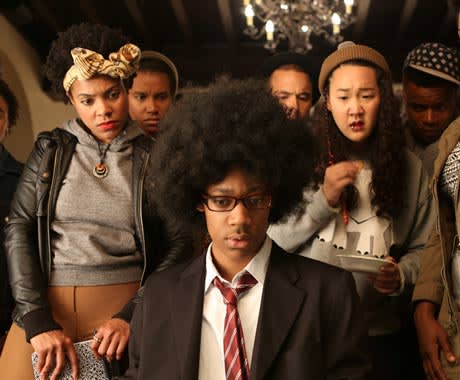Dear film goers: Please stop whatever it is you're doing and go see Dear White People, the delightful yet insightful new film by first time feature filmmaker Justin Simien. The winner of this year's Special Jury Prize at the Sundance Film Festival, Dear White People explores modern day racism at a predominantly white, Ivy League college in a supposedly post-racism America. Simien makes his very important point with style and wit to spare, and in doing so, announces himself as a fresh new voice in American filmmaking.
Dear White People takes its name from a college radio show aimed at exposing micro-aggressions against the black people on campus from the potentially well intentioned white student body. The show's founder, Samantha White (Tessa Thompson), is determined to expose the college's inherently prejudiced housing regulations, and in doing so, begins to take on a leadership role she isn't sure she wants. The rest of the ensemble includes Samantha's ex-boyfriend, Reggie (Marque Richardson), who left Samantha for a white girl at the insistence of his father, Coco (Teyonah Parris), a black woman determined to become famous no matter who that means she has to be, Tyler (Lionel Higgins), a gay black man who doesn't seem to fit in with the black students or the white ones and the college dean (Dennis Hasybert).
Tension on campus is mounting and boils over when a white fraternity decides to throw a black themed party, in a horrifically misguided attempt at homage. This forces each member of the cast to look inside and face who they are or, as they are still young, who they want to become, both in relation to and regardless of their race. As sharp and direct as the film is on the subject of race, Dear White People is still consistently and uproariously hilarious. It is never oversimplified but rather instead embraces its collegiate school of thinking while finding the humour always lying beneath the surface. Most importantly, though, Simien explores much of our contemporary thinking on race by focusing less on the collective and more on the individuals themselves, which is exactly how it should be.
(eOne)Dear White People takes its name from a college radio show aimed at exposing micro-aggressions against the black people on campus from the potentially well intentioned white student body. The show's founder, Samantha White (Tessa Thompson), is determined to expose the college's inherently prejudiced housing regulations, and in doing so, begins to take on a leadership role she isn't sure she wants. The rest of the ensemble includes Samantha's ex-boyfriend, Reggie (Marque Richardson), who left Samantha for a white girl at the insistence of his father, Coco (Teyonah Parris), a black woman determined to become famous no matter who that means she has to be, Tyler (Lionel Higgins), a gay black man who doesn't seem to fit in with the black students or the white ones and the college dean (Dennis Hasybert).
Tension on campus is mounting and boils over when a white fraternity decides to throw a black themed party, in a horrifically misguided attempt at homage. This forces each member of the cast to look inside and face who they are or, as they are still young, who they want to become, both in relation to and regardless of their race. As sharp and direct as the film is on the subject of race, Dear White People is still consistently and uproariously hilarious. It is never oversimplified but rather instead embraces its collegiate school of thinking while finding the humour always lying beneath the surface. Most importantly, though, Simien explores much of our contemporary thinking on race by focusing less on the collective and more on the individuals themselves, which is exactly how it should be.
